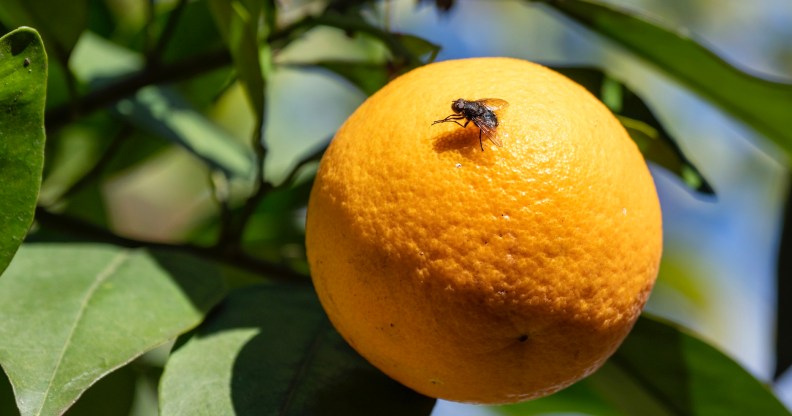Fruit flies experience same-sex attraction due to air pollution, according to science

Fruit flies experience male-to-male attraction due to air pollution (Jose A. Bernat Bacete/Getty Images)
Ozone pollution may be disrupting the mating patterns of male fruit flies, making them interested in other males, a study has suggested.
Research at the Max Planck Institute for Chemical Ecology, in Germany, found that ozone pollution can “degrade insect sex pheromones”, making fruit flies less able to recognise members of the opposite sex.
Researchers concluded that their findings could provide another reason for the “global decline in insect populations”.
Study author, professor Bill Hansson, the co-founder of the Max Planck Centre for Next Generation Insect Chemical Ecology, said: “Insects and their pheromones have evolved over millions of years. In contrast, the concentration of air pollutants has only increased dramatically since industrialisation.
“It is unlikely that the communication systems of insects, which have evolved over the course of evolution, will be able to adapt to new conditions within a short period of time if pheromones are suddenly no longer there.
“The only solution to this dilemma is to immediately reduce pollutants in the atmosphere.”
While ozone high in the Earth’s atmosphere protects humans from the sun’s harmful radiation, at ground level it is a pollutant known to harm people and plants.
For the study, male fruit flies were exposed to amounts of ozone similar to that found at ground level in polluted cities, for two hours. Researchers found that the insects experienced significantly decreased pheromone levels.
They also discovered that the pollution led to an increase in male-to-male courtship, which they believe may due to the fact that they rely on pheromones to differentiate between other males and females of the species. Female fruit flies were found to be less interested in male fruit flies exposed to pollution.
The scientists added that most insect pheromones contain carbon-carbon double bonds, which ozone pollution can destroy.
“High ozone levels are not only harmful to human health, the current lifestyle of industrialised nations comes at very high costs to the environment and climate. Many indirect effects are not even known,” the research said.
“The current study provides an additional explanation why insect populations are declining dramatically worldwide, apart from the application of insecticides and the elimination of habitats.
“If chemical communication is disrupted by pollutants in the air, they cannot reproduce at a sufficient rate… The fact that 80 per cent of our crops need to be pollinated by insects makes it clear what scale this problem may take in the future, if we do not succeed in drastically reducing air pollution.”
While this study shows same-sex attraction in fruit flies is an outcome of dangerous pollution levels, healthy same-sex attraction and mating has been observed in animals and insects across the world, with penguins, dolphins and sheep among animals that have been known to form same-sex bonds.
How did this story make you feel?

